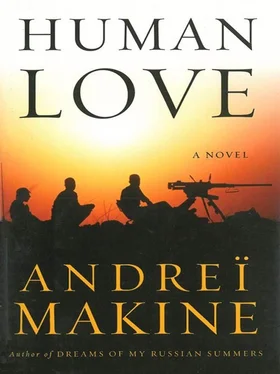At the year’s end comes the greatest surprise of all. Suddenly this whole game becomes completely pointless. The Americans abandon “the Candidate,” having found a creature more suited to their plans. French arms salesmen arrive in the marketplace and muddy the waters. In Moscow Andropov dies; power slips into an increasingly evident coma. In Luanda one tribe of corrupt men drives out another. The leaders furnish themselves with the services of new networks of traffickers. Bank account numbers are changed. The Angolan president promises the eradication, once and for all, of UNITA, which is supported by the Americans, and the immediate establishment of socialism, assisted by the USSR.
And of all this gigantic farce what remains is Elias Almeidas life, endangered several times, in order (I observe maliciously) to obtain two pieces of film in which a portly African and a buxom white woman can be seen glued together.
What also remains in my memory is Eliass look: cool determination and the sadness of one who no longer has any illusions.
Cabinda. What can be demanded of a life and a death .
Two years later we find ourselves in Cabinda, dining beside the harbor under a sky where the stars mingle with the lights on the oil rigs. Elias has just been spending time in northern Angola, “not far from the forests where those heroic UNITA idiots put us in the lockup,” he says with a smile. His right wrist is in plaster, and this shackle, too, is a reminder of that night long ago in Lunda Norte. Im on the point of asking him, in the same ironic tones, whether “the Candidate” could not by any chance be the sergeant who imprisoned us: he had a similar scar on his cheek.
A man and a woman, both of them quite elderly, appear in front of the rickety tables on the terrace where we are sitting. They walk one behind the other, joined together by two long planks, which they carry on their shoulders, one on each side of their heads. The resemblance to the wooden collars once used to keep slaves in line immediately comes to mind. “People like them live on a dollar a month,” says Elias softly without looking at me. “Joâo Alves, that apparatchik I knew in Moscow, has just bought a second house close to Lisbon. He s delighted that with the entry into Europe, property prices will go up…”
He remains silent for a long while, then, still in low tones, talks to me about his mission in Lunda Norte: to smash the diamond barter business, that vital sinew of war for UNITA (“Not to mention our ‘Marxists’ in Luanda,” he murmurs with gritted teeth). Arms for diamonds, and with the arms they conquer diamond-bearing territories and can thus buy more arms to conquer further territories. It is the same routine for oil…
“So wars a very profitable industry,” he says, nodding toward the oil rigs. “And what’s more, instead of retiring, soldiers get killed, which suits everybody. Nothing new about it as a production cycle. In the old days they stirred up conflicts between tribes to provide themselves with slaves. But slaves were hard work. You had to tie them up, rather like those two old people with their planks, take them to the coast, transport them across the ocean, give them a scrap of food… Diamonds can be turned into houses near Lisbon much quicker,”
I have an impulse to goad him into the admission I sense maturing within him: why risk his life if the dice are loaded and it is in everyone’s interest for this civil war to continue so they grow rich? I do not broach the topic head-on; I talk about the videotape of “the Candidate” and the turkey-woman. This fragment of film implied lengthy approach maneuvers, attempts at recruitment, blackmail… in the vague hope of having “our man” in a future government. Now all that work had come to nothing, producing only a video reminiscent of a third-rate blue movie.
I am expecting a political rationale, a precept I had heard on his lips before now: “You can’t make a revolution in kid gloves.” “A professional should never ask himself: What’s the point? That’s a question for Hamlets.” Yes, a half-mocking reply designed to stop all Jesuitical moralizing in its tracks.
This time there is no note of irony in his voice. “You know, maybe it’s my age, but I ask less and less of life. I often think it would have been enough for me just to have been able to save that child, you remember, in Lunda Norte, the one who’d put on an old gas mask. That little lad completely high on drink and drugs. I should have told him to hide so as not to be shot in the morning…”
The old couple walk back close to the restaurant where we sit at the table. Relieved of their burden, the man and woman nevertheless walk as before, one behind the other, with the same heavy tread. Elias watches them walking away, then, without changing his tone, continues: “And with death it’s the same. When I was young I lacked all modesty, I dreamed of it being heroic, flamboyant. On the barricades, in some way or other… One day I learned how Antonio Carvalho died, my first master in Marxism. They tortured him appallingly to make him denounce me. Mine was the eye that got in their way, the ‘man from Moscow’ to be got rid of. Carvalho defeated them all because he smiled! Yes. He said nothing, just smiled. Right to the end…”
We fell silent, our eyes directed toward the ocean, toward the darkness pockmarked with flares from the oil rigs. By day and night, deep in the dense waters, steel tubes suck in the earth’s black blood. This oil is transformed into arms, then into the red blood of human beings.
Elias gives a slight shake of his head: “You say: two scraps of film with that fat pig fucking her… It’s not as simple as that. Under pressure from the Americans, that fellow had big plans. To create a real Zairean army equipped by the United States. An army of professionals, no longer those gangs of pillagers and drunkards Mobutu has at his disposal. If it had worked, we’d have had another war. And we’d have lost it. We managed to sideline that young man with his weakness for beautiful blond women… Another war. Yes. We’ve already reached seven hundred thousand dead since we started building the radiant future. And those seven hundred thousand include Carvalho. And that child buried with his gas mask on his head…”
He is aware of a note of justification in his words, the eternal reasoning of spies: devious maneuvers, this necessary evil in order to prevent a much greater evil. Yes. the ousting of one crook to save thousands of innocents… the old argument revolutionaries and other benefactors of humanity generally put forward. We exchange glances, aware of what can lie hidden behind this “necessary evil.”
Ellas begins to talk with a more relaxed, almost amused, air: “Its true that Zairean looked very like the sergeant who interrogated us at Lunda Norte. That scar from a bullet in the shape of an asterisk. But it wasn’t him. Just a man of the same type. An ambitious career soldier thrust toward the top either by ourselves or by the Westerners. One of those pawns they try to turn into a leader. Sometimes they crack. Sometimes they succeed, and you get Bokassa, Idi Amin, Mengistu, and the rest. If you can call that success. Yes, the same mold. The ingredients are always similar: money, an almost sensual desire for power, the flesh of women. I’ve met humans in this mold in Guinea-Bissau, in Brazzaville… To begin with you actually think you’re meeting the same person. And it’s not so much their physique that’s deceptive. There are big ones and little ones. No, it’s… their eyes, which seem to be saying: I’m ready for anything. Like that Zairean you saw. To ride in the limousine with that fat blond, he was ready to cover a whole country in graves.”
We walk to the end of a jetty where we can feel the keen nocturnal force of the wind off the open sea. Elias s shirt flaps around his body making him look thinner, more fragile. In my mind’s eye I have a sudden vision of him, alone, assailed by a crowd of men whose faces are impossible to make out, they look so alike. Men cast in that mold, I tell myself, against whom he strives to fight… It is a losing battle, and he knows it. History, whose course he dreamed of changing, is in fact nothing more than an elegant metaphor, and a man staring at a woman’s broad thighs as she sits on a car seat, yes, often the hungriness of such a stare counts for more in this metaphor than the noblest of ideals and the commitments to causes made by heroes.
Читать дальше









